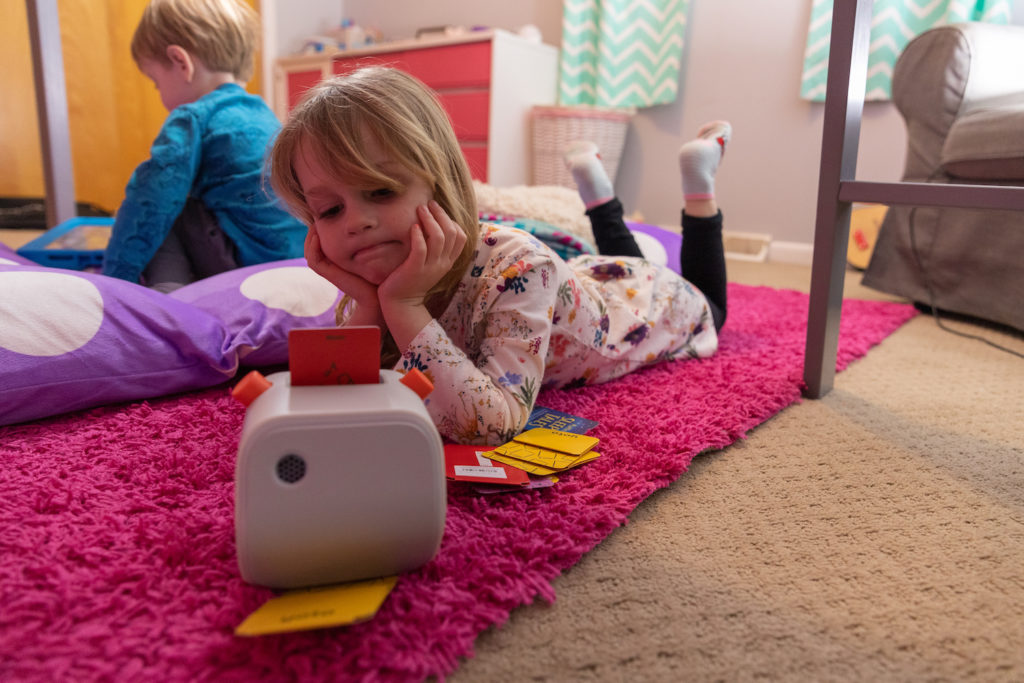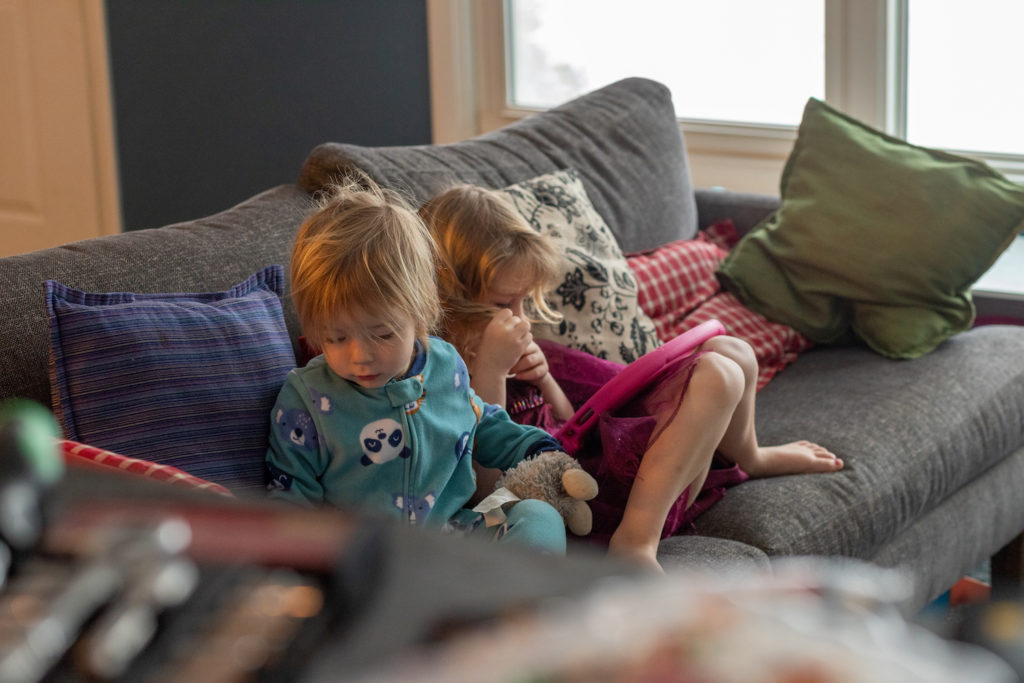I eagerly awaited the day my 1-year-old would start having full conversations. Life would be so much easier when she could communicate her needs. And tell us what she learned at Kindergarten. Then finally, that day came. And she said 5,000 words before I finished my first cup of coffee. You wish for it, but it’s not something you prepare for like with sleep training and dinner struggles. And then comes the balance between communicating with your child and preserving your sanity. Here are some strategies to hit the reset button when your child talks nonstop.
- Why does my child talk constantly?
- 1. Turn questions back on them
- 2. Give your full attention at least part of the time
- 3. Arrange a quiet time
- 4. Take a shower every day
- 5. Use distraction to your advantage
- 6. Be the first one up in the morning
- 7. Chit chat over FaceTime
- 8. Use helpful phrases
- A few final thoughts
Why does my child talk constantly?
It’s normal for toddlers and preschoolers to talk nonstop – from sun up to sun down. And it’s not a bad thing. There are several reasons why it happens:
Young kids are showing off their new skill.
When your child first learns to talk, they want to show the world (and this takes the form of talking all the time). They are proud of their new skill – just like when they first learn to walk, they flat out refuse to ever sit down again
They are really excited about something.
They are scared about something.
The opposite of being passionate about something, they may be scared. They may be having trouble calming down. They may need reassurance from you. And they probably won’t stop until they feel a little more relaxed.
Being talkative is learned and then reinforced with attention.
Your kids see you talking or other people talking, so they try it out. If they are rewarded with attention or help with their needs, the behavior is then reinforced and they keep doing it more often.
Having a talkative kid on your hands may seem exhausting at times, but there are many advantages. Chatty kids have better communication skills, which makes sense when it’s a skill they constantly practice. They tend to be more curious; asking questions and problem solving. They learn to use their voice at an early age. They develop better social skills. And they learn to be better negotiators (so prepare yourself).
So how do you keep yourself from going nuts when your little one is chatting up a storm?
1. Turn questions back on them
You’re driving along in the car and BAM! Hundreds of questions come at you at once.

“Why is the car moving so fast?”
“Can I have a snack?”
“How do bees make honey?”
“Can I have a snack?”
It’s frustrating to answer question after question with no end in sight. And it’s just your kid’s way of learning. They are curious. Though at the time, it feels more like they want you to slowly rip all your hair out. So here’s a good tip: turn the questioning back on them. When they ask “why is the sky dark at night?”, you respond with “That’s a good question, why do you think?”.
And then their little brains start churning. They start thinking of creative answers. And this thinking time results in seconds, or in some cases, minutes of quiet. And that’s all you need.
Plus, it’s always a good idea to balance out the conversation. You ask questions, your kids ask questions. That way, they know you are engaged.
2. Give your full attention at least part of the time

You pick your little one up from daycare and they just unload. A minute-by-minute replay of their entire day. And you respond with the typical “mhmm”, “wow, that’s cool”, “yeah”. We all do it and any parent who claims they don’t is most definitely lying to you. It’s impossible to be fully committed to the conversation 24/7 when your child talks nonstop. But you should give them your full attention at least part of the time.
Kids are intuitive and they know when you are dismissing them. Spend some time making eye contact, asking them about their day, and giving thoughtful responses. When they have your full attention, they are less likely to keep talking because they are more satisfied with the discussion.
If you are only giving them half your attention all the time, they are going to notice. And the result: “I better keep talking until mom or dad hears me”.
3. Arrange a quiet time

The days of afternoon naps may be long gone, but you’re not out of the game. Designate an hour or two every day for quiet time. Your little one can read quietly in their room, watch a movie, listen to music, or whatever you choose as the quiet time activity. This gives you a little time each day to recharge your batteries and get ready for the evening chatter.
We recently discovered a screen free audio device called the Yoto Player. You can choose stories and music for kids to listen to during quiet time. But the coolest feature is that you can record your own voice – telling a story (or singing if you’re brave). It’s not a substitute for 1-1 conversation, but it’ll encourage your little one to stay in their room during quiet time if they can play your voice.
4. Take a shower every day
This has absolutely nothing to do with getting clean, and everything to do with peace and quiet. I work from home and don’t particularly care about showering every morning. Except that it’s an excellent way to hit the mental reset button. It’s the one place where you have quiet time to yourself. It’s amazing what one simple shower can do when you’re feeling burned out and totally exhausted.
5. Use distraction to your advantage

If you allow your kids screen time, this is an excellent time for you to reset. Mostly because kids turn in to zombies. The American Academy of Pediatrics recommends limiting screen time to one hour a day for kids ages 2 to 5. A lot of quiet time can happen in this hour.
If screens aren’t your thing, keep other distraction methods in your arsenal. Blocks, puzzles, crayons, playdough, obstacle courses, and my personal favorite – building a fort.
6. Be the first one up in the morning

Waking up early can seem like the worst kind of torture when you’re in the throes of parenthood. Particularly if you aren’t getting enough quality sleep to begin with. But imagine two scenarios:
- Your kids serve as your alarm clock. They wake you up every morning and you are immediately in a flurry of morning routine.
- You wake up before your kids. The first hour of your morning is filled with peace and quiet. Sip your coffee, watch the news, read a book. You do you.
Out of the two options, which seems like the more relaxing way to start your day? If you’ve been waking up with your kids, try waking up before them. It’s not the easiest habit to start, but it can set the stage for your day.
7. Chit chat over FaceTime

When your child talks nonstop, FaceTime is like taking a vacation. Dial up a friend or family member, hand your little one the phone, and enjoy a nice break. So what if the phone is pointed at the ceiling? The key here is that someone else is taking the brunt of the talking, while you are enjoying a little time off.
It’s a great way to hit the reset button when you are feeling particularly drained.
8. Use helpful phrases
Using filler words or passively responding when your toddler or preschooler talks constantly will only maintain the conversation. When responding with “yep” and “cool”, their little detectors go off and they know you aren’t listening.
Instead, explain to them that you are doing something and will talk in a minute. Saying something like “Wow, that sounds like a fun story. I’m making dinner right now, but let’s talk about it when I’m finished”.

And then follow through and actually be present when they tell their story. Using helpful phrases will let your little one feel heard, but also provide an explanation why you can’t be fully engaged.
This is also a good time to teach good habits. If your child is constantly interrupting, offer some helpful feedback.
I’ll be with you in a minute. Next time, try ‘excuse me’ so I know when you’re waiting to talk
A few final thoughts
Hitting the reset button is different from survival mode. It’s about allowing for self-care in the moments you need it most. Have you ever become so overwhelmed by the chattiness that you lose it? You break and angrily shout at your little one to stop talking. And then you feel guilty for the rest of the day.
Those moments are preventable if you take time for yourself before getting to the point of no return. And you’ll be better for it.
Remember, you are the coach. And when your child talks nonstop there are things you can do to guide them. Try out some of these approaches to teach them that you need breaks too. And that’s perfectly okay.
You may also like:
The Clever Way to Limit Toddler Screen Time (That Also Helps with Sleep)
3 Calm Down Strategies for Stopping a Toddler Temper Tantrum
